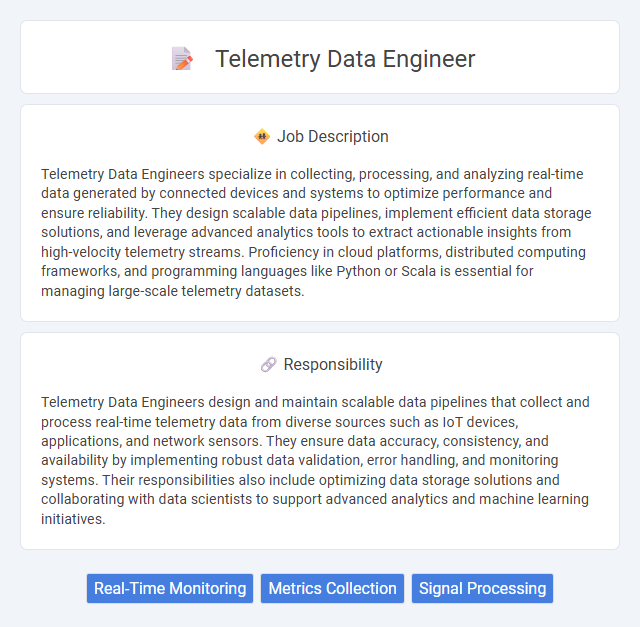
Telemetry Data Engineers specialize in collecting, processing, and analyzing real-time data generated by connected devices and systems to optimize performance and ensure reliability. They design scalable data pipelines, implement efficient data storage solutions, and leverage advanced analytics tools to extract actionable insights from high-velocity telemetry streams. Proficiency in cloud platforms, distributed computing frameworks, and programming languages like Python or Scala is essential for managing large-scale telemetry datasets.
Individuals with a strong analytical mindset and a passion for data analysis are likely to find the Telemetry Data Engineer role suitable. Candidates who enjoy working with complex datasets, possess proficiency in programming languages, and have a keen eye for detail may be better aligned with the job's technical demands. Those who thrive in fast-paced, problem-solving environments could have a higher probability of excelling in this position.
Qualification
A Telemetry Data Engineer requires expertise in data collection, processing, and analysis from remote sensing systems, with strong proficiency in programming languages such as Python, SQL, and Java. Experience in cloud platforms like AWS or Azure, combined with knowledge of stream processing frameworks such as Apache Kafka and Apache Spark, enhances real-time telemetry data handling. Advanced skills in data modeling, database management, and experience with IoT protocols like MQTT are essential for effective telemetry data engineering.
Responsibility
Telemetry Data Engineers design and maintain scalable data pipelines that collect and process real-time telemetry data from diverse sources such as IoT devices, applications, and network sensors. They ensure data accuracy, consistency, and availability by implementing robust data validation, error handling, and monitoring systems. Their responsibilities also include optimizing data storage solutions and collaborating with data scientists to support advanced analytics and machine learning initiatives.
Benefit
Telemetry Data Engineers likely experience significant benefits including enhanced career opportunities due to expertise in managing and analyzing large-scale data streams from connected devices. They probably gain exposure to cutting-edge technologies and methodologies, increasing their technical proficiency and marketability. The role may also offer competitive compensation and the chance to contribute to real-time decision-making processes critical for industry innovations.
Challenge
Telemetry Data Engineer roles likely present significant challenges in managing and processing vast volumes of real-time data from diverse sources. Ensuring data accuracy and consistency while optimizing storage and retrieval systems can be complex and technically demanding. The probability of encountering issues related to data integration, scalability, and system performance remains high, requiring strong problem-solving and analytical skills.
Career Advancement
Telemetry Data Engineers leverage expertise in data collection, processing, and analysis to optimize system performance and product reliability across industries like automotive and IoT. Mastery in cloud platforms such as AWS or Azure, proficiency in big data tools like Apache Kafka and Spark, and skills in Python or Scala coding significantly enhance career growth opportunities. Progression often leads to senior engineering roles, data architect positions, or leadership roles in data strategy and analytics.
Key Terms
Real-Time Monitoring
Telemetry Data Engineers specialize in collecting, processing, and analyzing real-time monitoring data from distributed systems to ensure optimal performance and rapid anomaly detection. They utilize streaming data pipelines and real-time analytics platforms like Apache Kafka, Apache Flink, and Prometheus to handle high-velocity telemetry data efficiently. Their expertise enables proactive system health monitoring, reducing downtime and enhancing operational reliability through immediate insights.
Metrics Collection
Telemetry Data Engineers design and implement scalable metrics collection frameworks to monitor system performance and user behavior effectively. They leverage tools like Prometheus, Grafana, and OpenTelemetry to capture real-time data streams, ensuring high accuracy and low latency in data ingestion. Their expertise in data pipelines, monitoring infrastructure, and anomaly detection plays a crucial role in driving data-driven decision-making processes.
Signal Processing
Telemetry Data Engineers specializing in signal processing design and implement algorithms to extract meaningful insights from raw telemetry signals collected across various devices and sensors. They leverage advanced techniques such as Fourier transforms, filtering, and time-series analysis to process complex data streams, enabling real-time monitoring and anomaly detection. Expertise in programming languages like Python and tools such as MATLAB or TensorFlow is essential for developing scalable, automated data pipelines that optimize telemetry data accuracy and reliability.
 kuljobs.com
kuljobs.com